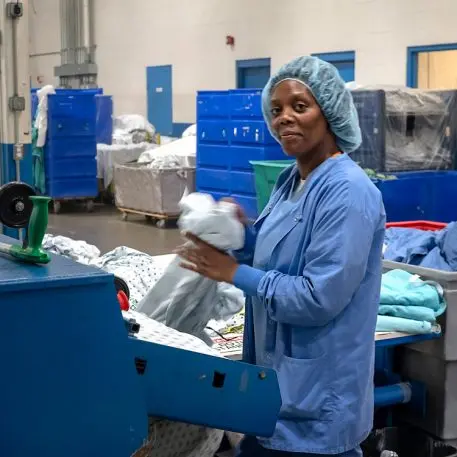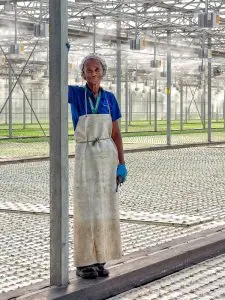In May, the Evergreen Cooperatives, a network of worker-owned businesses in Cleveland, took over operations of a laundry facility owned by the Cleveland Clinic. On the surface, it was a straightforward business transaction. The Evergreen Cooperatives launched in 2009 with Evergreen Cooperative Laundry, a small business owned and operated by just a handful of workers. Today, the whole network comprises the laundry, as well as a cooperative green energy business and an urban farm, and employs more than 220 people. After nearly a decade of steady growth, the Evergreen Cooperatives wanted to expand, and taking over operations of the Cleveland Clinic laundry facility was an opportunity to do so.
That was where business-as-usual ended. Generally, when management of a workplace changes, employees continue to do what they did before, just under new leadership. But when Evergreen Cooperative Laundry took over the contract at the Cleveland Clinic laundry facility, its 100 employees got a new title: worker-owners. To make the transition successful, the Evergreen Cooperatives network held training and informational sessions with the new members, educating them on profit sharing and collective governance.

After monitoring the success of the Evergreen Cooperatives in Cleveland’s poorer communities, the network now wants more businesses to get on board with it. The takeover of the Cleveland Clinic laundry facility was a pilot for a larger program, the Fund for Employee Ownership, that the Evergreen Cooperatives and the Democracy Collaborative, a nonprofit focused on building community wealth, just launched to expand opportunities for co-op conversions. Initial funding of $5 million from a foundation (which is remaining anonymous) will allow the partners to replicate the model they tested with the Cleveland Clinic laundry facility: acquiring small local businesses looking for new ownership, then, once that transaction is completed, working with the employees to transition the business to a worker-owned cooperative. Over the next several years, they hope to use the initial funding to convert around seven businesses, and aim to eventually reach $30 million in funding.

Evergeen and Democracy Collaborative are calling this the acquire-convert-support strategy. With the launch of the Fund for Employee Ownership, they’ll start identifying small businesses looking to sell, which they can acquire and bring under the growing Evergreen Cooperative umbrella. “They’ll benefit from our existing network, strong professional management, and shared back-office resources like HR and accounting,” Rose says.
For the time being, the partnership will remain focused on expanding worker-owned cooperatives in Cleveland and northeast Ohio. The Evergreen Cooperatives already have a track record of success in the city. Founded in 2009 with capital from major local institutions like the Cleveland Clinic, Case Western Reserve, and the Cleveland Foundation, Evergreen has been able provide livable wage jobs (around $11 per hour, increasing over time) to over 200 people from neighborhoods where unemployment rates hover around 25%, and median annual income is $18,500. Worker-owned cooperatives are an effective method of stabilizing local economies, and expanding their presence in Cleveland through this fund, Jones says, will raise awareness of their success. “Starting local will make sure that we can really feel out the mechanics of our fund, and see its impact, before stretching too far,” Jones adds.
But developing this type of resource to grow the number of worker-owned businesses in the U.S. (there are currently around 7,000), could be something for other cities to pursue–especially as millions of baby-boomer business owners are set to retire in the next decade.
“There’s a lot of interest in how we capture the ‘silver tsunami’ moment,” Rose says. “A lot of these baby-boomer businesses are going to need to transfer ownership outside of a family heir. We’re concerned that if their businesses fall into the traditional merges and acquisitions space, that will result in more job loss and loss of wealth for communities,” she adds. “But we’re also excited about the potential to be able to capture a portion of that opportunity and convert companies to employee ownership.”
Recognize your brand’s excellence by applying to this year’s Brands That Matter Awards before the early-rate deadline, May 3.
